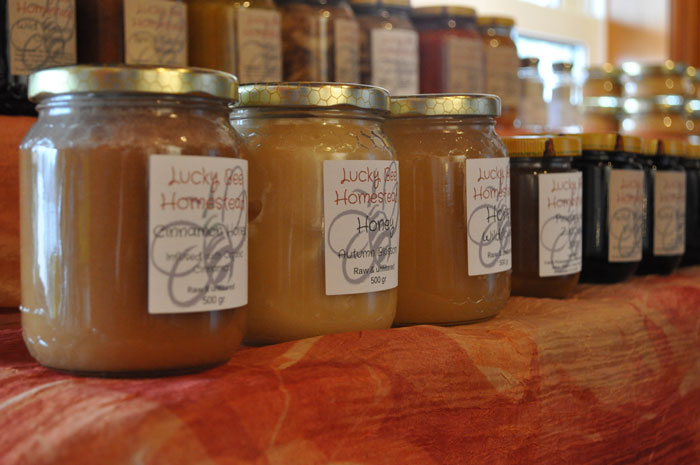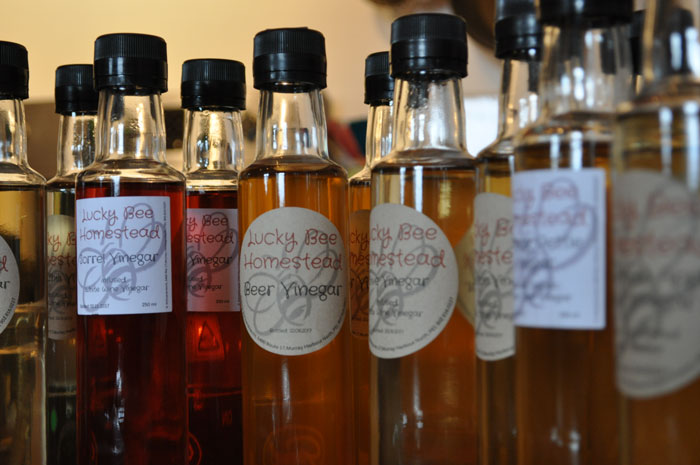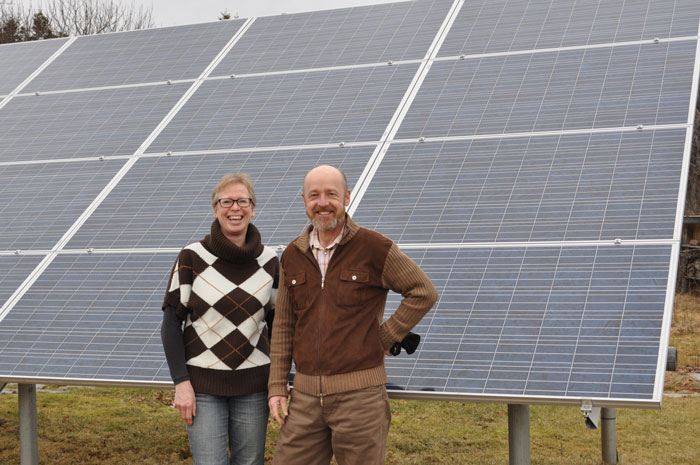Self-sufficient farm turns into profitable business
Finding the right place for a farm is never an easy task. Many variables must be taken into consideration, and after crisscrossing Canada, Sabine and Michael Schoenknecht finally found the perfect spot in Murray Harbour North.
Establishing a self-sufficient lifestyle was their dream. And what was originally meant to feed only themselves is now known as Lucky Bee Homestead, provider of honey, jam, vinegar, fermented veggies, fresh baked bread, and their core product: a wide range of naturally flavoured, organic mustards.
It was quite an odyssey for Sabine and Michael until they finally settled at their beautiful PEI location. The lure of moving to Canada started with their honeymoon spent in an RV driving from Vancouver to Calgary, and then Sabine’s maid of honour moved to Toronto. “That’s when we started thinking about doing this as well,” Sabine said.
In 2009, they made the leap, moving to Alberta, following a job offer for Sabine. The promised job turned out to be barely existent, so the Schoenknechts soon found themselves in BC. Sabine’s background in hospitality and hotel management allowed her to work in various positions as restaurant manager and housekeeping supervisor. But ultimately the East Coast called to them. In 2012, they moved to Nova Scotia. And didn’t stay long. “We didn’t really feel at home,” Michael said, so it was back to BC with bag and baggage. However, they had visited PEI for a weekend before returning west and our island made quite an impression on them. So, in 2013, another trip across the country led them to their new PEI home.
Their German roots and childhood experiences were key influencers when setting up their new lives here. Coming from a family with a self-sufficient lifestyle (Sabine’s) and one of millers and farmers (Michael’s), they started with the essentials. Like many Germans, they missed the bread from their home country (being German myself, I can attest to that), so they began growing veggies and baking bread.

Some honey and preserves at Lucky Bee Homestead’s shop//Photo credit: Cheryl Young/Salty
Sabine followed her beekeeping father’s footsteps in 2014 by taking care of her first beehive for another beekeeper. Quickly after, she got her own bees and started selling honey under the brand name Bee Bine’s Honey (a German play on words: Bine=short for Sabine; Biene=bee in German). Bee Bine’s Honey turned into Lucky Bee Homestead, and today, they offer 44 products based on what they grow on their farm and organic ingredients they buy from the region, like organic mustard seeds and flour. Offering fermented products like mustards, vinegars, and sauerkraut seemed to make the most sense for the German immigrants.
“For our own consumption, we only buy ‘luxury’ foods such as chocolate and dairy products. We tried to do dairy; we had a goat but she didn’t like us,” Sabine said. “We also make our own beer and wine, and have added laying hens and meat chickens to the farm.”
Sabine and Michael Schoenknecht in front of their solar panels//Photo credit: Cheryl Young/Salty
Self-sufficiency isn’t only about food though. Growing up in Germany meant growing up thinking green. So the Schoenknechts invested in solar cells for their electricity needs as soon as they purchased the farm. In the summer months, they feed excess power back into the system. In return, they can use the electricity credits in the winter months when the solar cells are naturally less active. “We would have loved to go fully off the grid but the solar battery needed for that is a bit out of our price range right now,” Michael said.
Solar energy on PEI
Solar power is one of the green energy alternatives in PEI. Unfortunately there are no incentives nor rebate programs from the province. Certain tax credits may apply. Taxes are, however, a disputed topic when it comes to generating your own solar power. The excess you feed into the grid you can retrieve later, but only by paying HST on it. Your own electricity is also considered income and must be claimed with your tax submission. With PEI having some of the highest electricity prices in the country, and solar being considered a renewable energy source, this still seems to be a great alternative.
The couple has plenty of ideas to grow their homestead business, and Michael’s background in sales certainly doesn’t hurt. Lucky Bee is already a staple at the Cardigan Farmers Market in the summer, and the Schoenknechts have been to a multitude of craft and Christmas fairs this past fall and winter. A shop at their homestead is the newest addition to their business. The Thursday Night Market in Charlottetown and the Charlottetown Farmers’ Market are part of future plans. Currently, the Schoenknechts are working on their new product and nutrition labels to be able to sell to other stores, and have a Canada-wide online store.
Busy bees, they are. “The garden and the animals, that’s fun to take care of, and a bit of routine. Growing things naturally and raising animals humanely are our main drivers,” Sabine said.
The friendly couple also has a strict division of labour. Sabine bakes, and makes the mustards and vinegars while Michael takes care of the farming and chickens, as well as preserving fruits into jams and relishes. “And he does the dishes. He is a trained dishwasher,” Sabine joked. A successful working marriage and business, indeed.
- WHAT’S THE SCOOP? - June 1, 2019
- TARTNESS FROM EAST TO WEST - April 1, 2019
- ONE CLAN, ONE PLAN, ONE ORCHARD, ONE CIDER - February 1, 2019
- A TASTE OF SUMMER IN THE DEAD OF WINTER - December 1, 2018
- Retail Lessons Learned - October 28, 2018
- A DOWN HOME KITCHEN PARTY - September 25, 2018
- The Doors Are Open - June 24, 2018
- Sweet Success - June 1, 2018
- SEARCHING FOR CHOICE IN ISLAND STORES - May 1, 2018
- Zero Dollar Small Business Marketing 101-Maritime Marzipan - April 25, 2018



